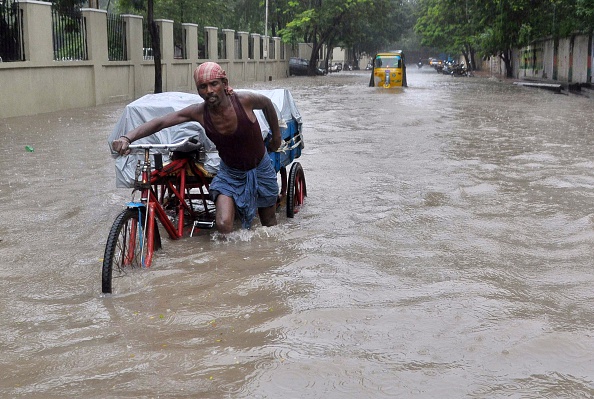NEW DELHI – The heaviest rainfall in more than 100 years has devastated swathes of the southern Indian state of Tamil Nadu, with thousands forced to leave their submerged homes and schools, offices and a regional airport shut for a second day Thursday.

At least 269 people had been killed in the state since heavy rains started in the beginning of November, said India’s Home Minister Rajnath Singh, although no deaths have been reported in the latest deluge.
“I can’t even believe that this much water was possible in Chennai,” one woman told NDTV channel as she stood in waist-deep water in the state capital.
“We don’t have any food. We don’t have any milk,” she said, adding that she had stepped out to see if she could find a shop selling some food. “But I’m scared to walk down this road. The water comes up almost to my hips.”
Chennai has received more than 330 millimeters (13 inches) of rain over the last 24 hours, which is significantly higher than the regional average for the entire month of December, Singh said.
While the downpour eased early Thursday, the Indian Meteorological Department has predicted more heavy rain in several parts of the state through the rest of the week. The rains have been caused by a depression in the Bay of Bengal, the agency said.

Get daily National news
Separately, news reports said that flood waters released from a lake on the outskirts of Chennai inundated more neighbourhoods in the city. The Adyar river, which runs through Chennai before draining into the Bay of Bengal, was flowing above a danger mark.
India’s Prime Minister Narendra Modi surveyed the destruction and flooding from an air force helicopter.
An aerial view of Chennai showed low-lying neighbourhoods as well the city’s airport almost completely submerged. The Airport Authority of India said that the airport was likely to be closed until Sunday.
Dozens of trains to the state have been delayed this week, and on Thursday the main train station was so heavily flooded that it had to shut down operations. Singh said that railways officials convened an emergency meeting to get the station back on track quickly.
Even though hundreds of army, navy and local police and fire department rescuers were helping evacuate those trapped in their homes, Twitter and other social media were flooded with calls for help from across the city.
Most of those still trapped were either the elderly or people with very young children.
The state government cut power to several parts of Chennai as a safety measure to prevent electrocutions. Most deaths in the last month of rains have been due to drowning, electrocution and wall collapses.
India’s main monsoon season runs from June through September, but the period between October to December – also called the retreating monsoon – brings the most rainfall to India’s southeastern coastal areas.
The extreme weather in Chennai comes as heads of state are meeting in Paris to try and work out a new treaty to limit global warming and deal with its effects. However, experts say the floods in the city are most directly linked to the El Nino weather pattern, when the waters of the Pacific Ocean get warmer than usual.
“This year saw the strongest El Nino ever recorded,” said G.P. Sharma, vice-president of meteorology at Skymet, a private weather forecaster. He said that was indicative of an extremely heavy retreating monsoon.
El Nino is one of the factors India’s government-run Met office takes into account while forecasting the monsoon. This year, India had a weaker than usual summer monsoon, as it does in an El Nino year.







Comments